Abstract
OBJECTIVES: In this study, longitudinal data are used to examine the effect of work status on breast-feeding initiation and duration. METHODS: Mothers from a mail panel completed questionnaires during late pregnancy and 10 times in the infant's first year. Mother's work status was categorized for initiation by hours she expected, before delivery, to work and for duration by hours she worked at month 3. Covariates were demographics; parity; medical, delivery, and hospital experiences; social support; embarrassment; and health promotion. RESULTS: Expecting to work part-time neither decreased nor increased the probability of breast-feeding relative to expecting not to work (odds ratios [ORs] = .83 and .89, P > .50), but expecting to work full-time decreased the probability of breast-feeding (OR = .47, P < .01). Working full-time at 3 months postpartum decreased breast-feeding duration by an average of 8.6 weeks (P < .001) relative to not working, but part-time work of 4 or fewer hours per day did not affect duration, and part-time work of more than 4 hours per day decreased duration less than full-time work. CONCLUSION: Part-time work is an effective strategy to help mothers combine breast-feeding and employment.
Full text
PDF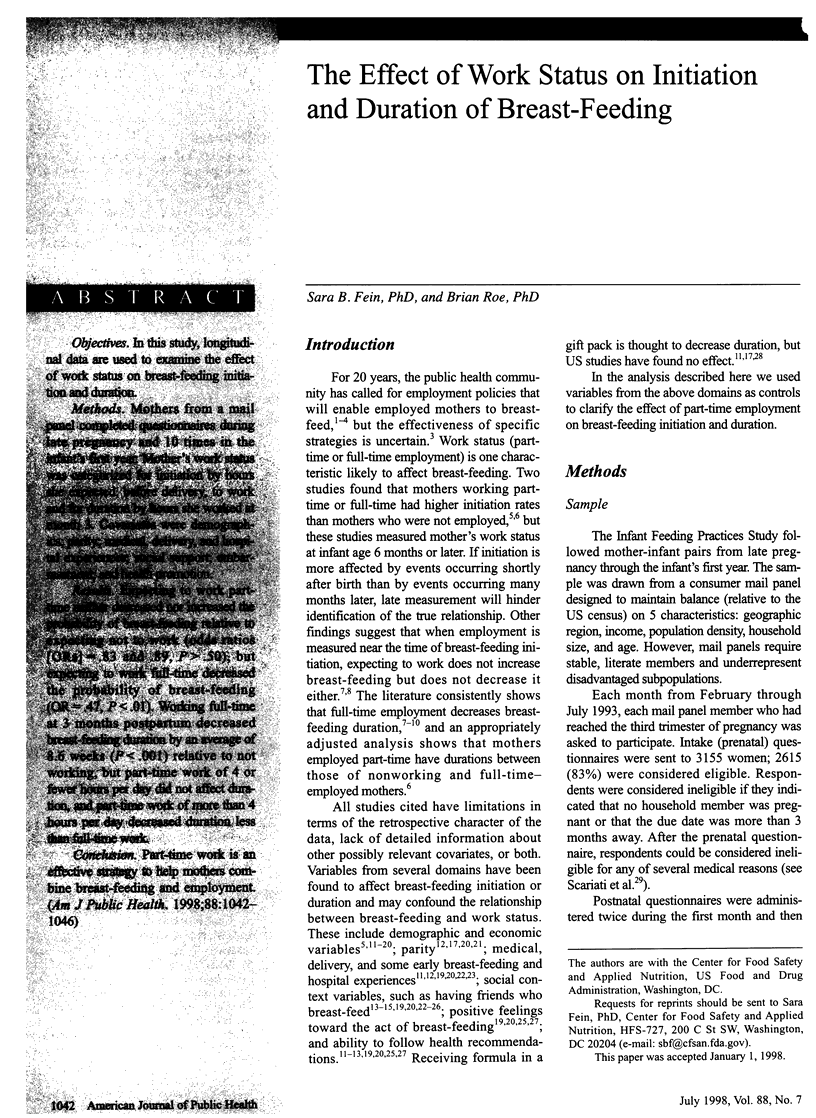
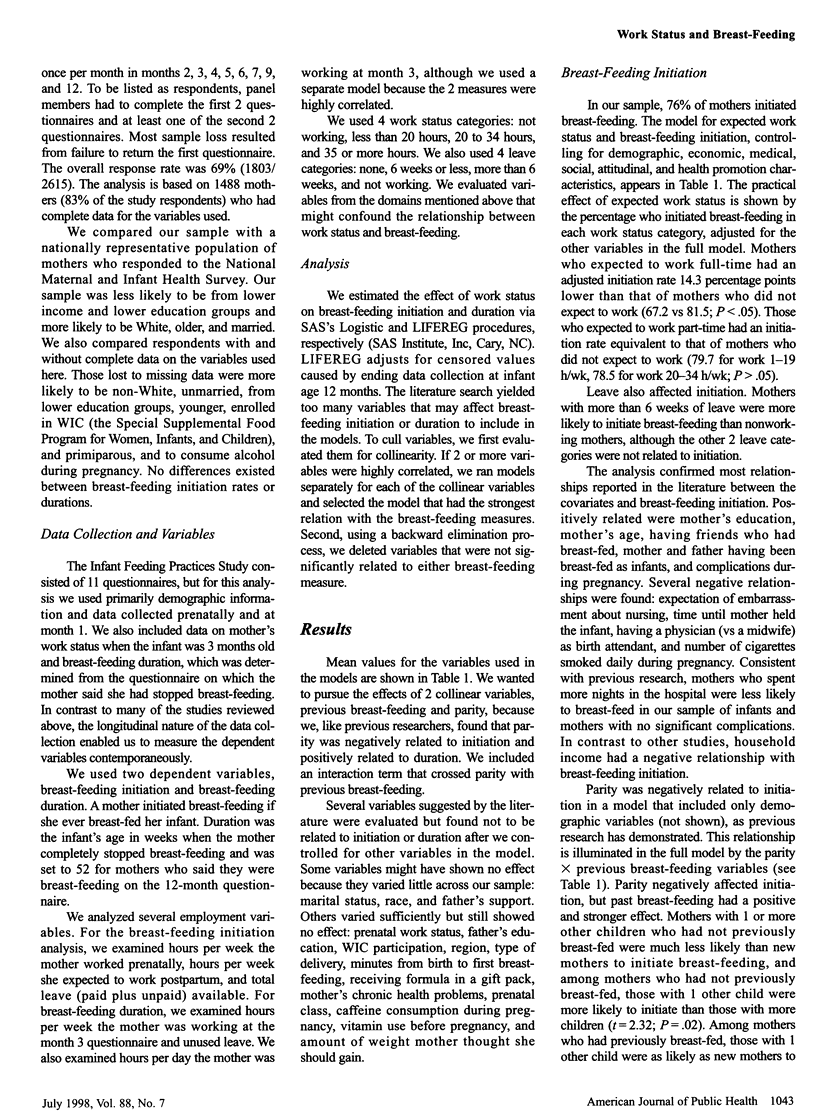
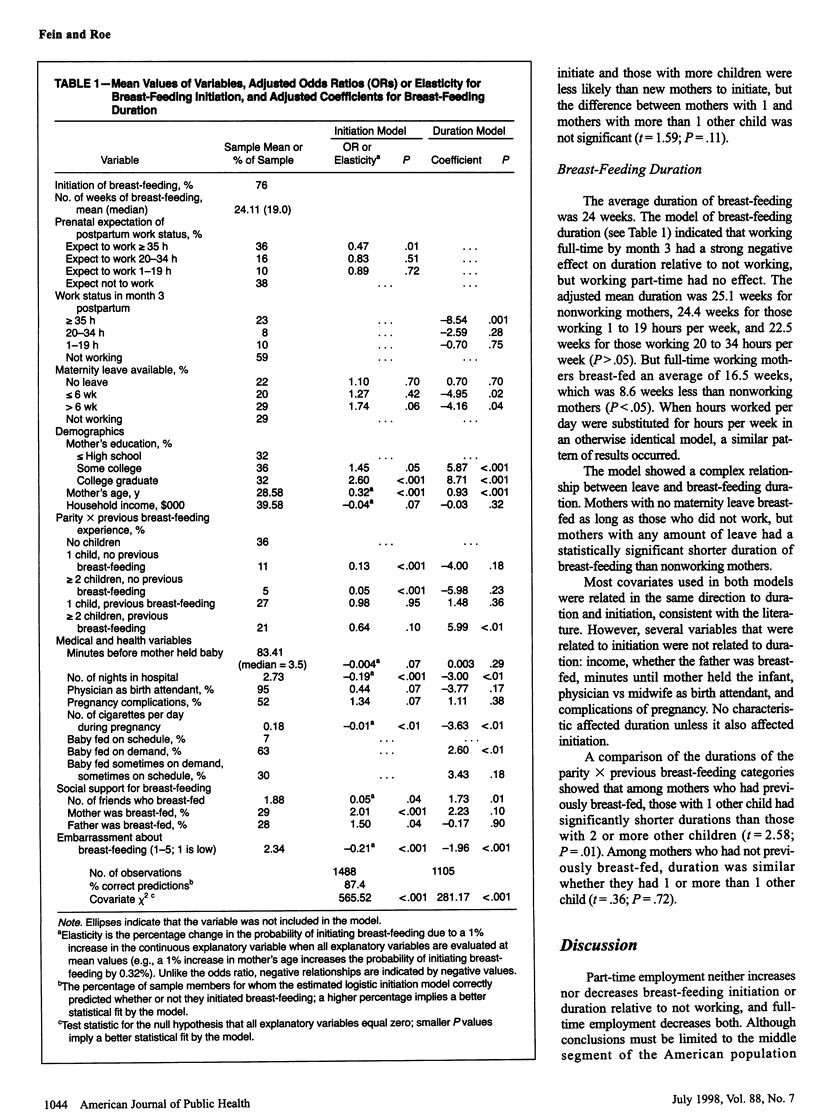
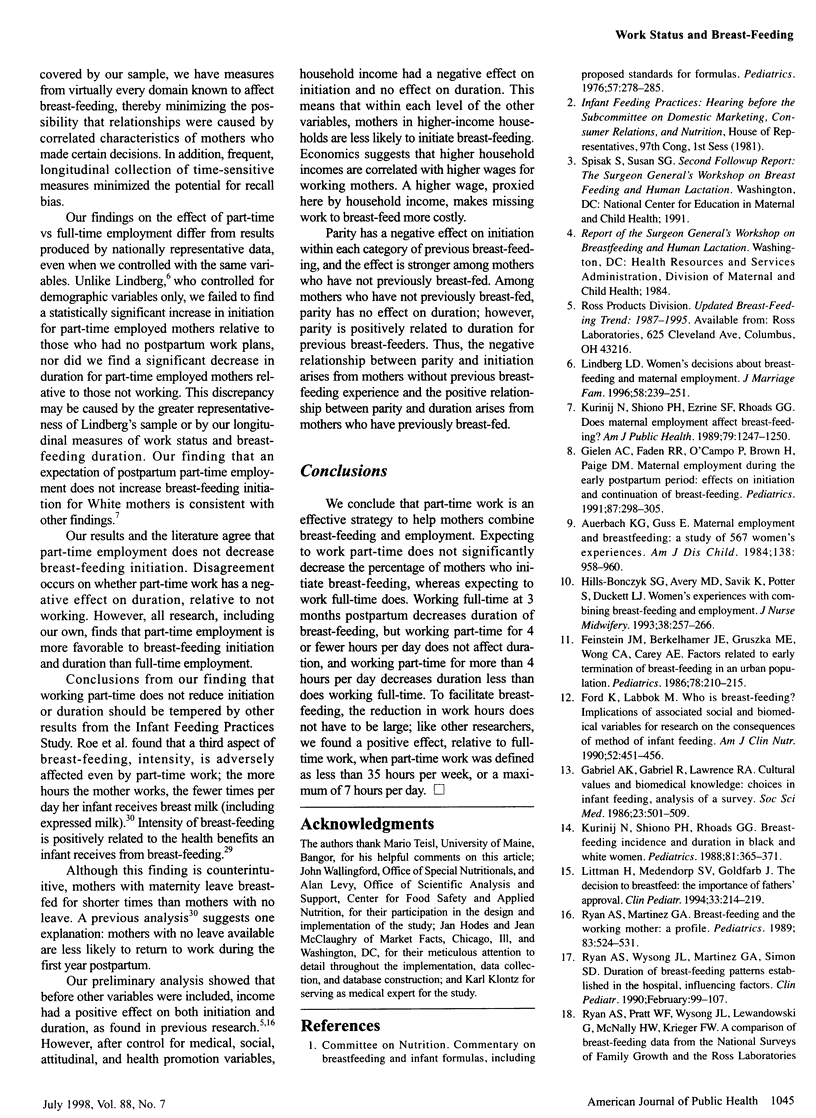
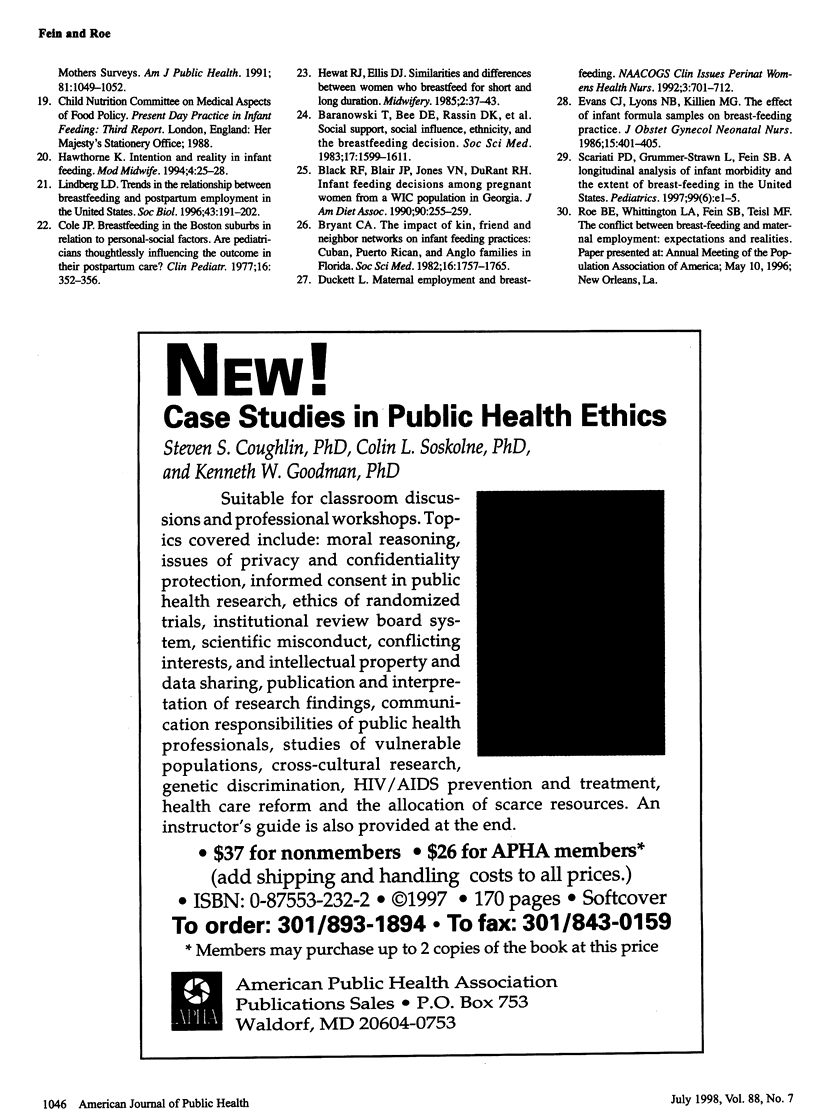
Selected References
These references are in PubMed. This may not be the complete list of references from this article.
- Auerbach K. G., Guss E. Maternal employment and breastfeeding. A study of 567 women's experiences. Am J Dis Child. 1984 Oct;138(10):958–960. doi: 10.1001/archpedi.1984.02140480060018. [DOI] [PubMed] [Google Scholar]
- Baranowski T., Bee D. E., Rassin D. K., Richardson C. J., Brown J. P., Guenther N., Nader P. R. Social support, social influence, ethnicity and the breastfeeding decision. Soc Sci Med. 1983;17(21):1599–1611. doi: 10.1016/0277-9536(83)90306-4. [DOI] [PubMed] [Google Scholar]
- Black R. F., Blair J. P., Jones V. N., DuRant R. H. Infant feeding decisions among pregnant women from a WIC population in Georgia. J Am Diet Assoc. 1990 Feb;90(2):255–259. [PubMed] [Google Scholar]
- Bryant C. A. The impact of kin, friend and neighbor networks on infant feeding practices. Cuban, Puerto Rican and Anglo families in Florida. Soc Sci Med. 1982;16(20):1757–1765. doi: 10.1016/0277-9536(82)90269-6. [DOI] [PubMed] [Google Scholar]
- Cole J. P. Breastfeeding in the Boston suburbs in relation to personal-social factors. Are pediatricians thoughtlessly influencing the outcome in their postpartum care? Clin Pediatr (Phila) 1977 Apr;16(4):352–356. doi: 10.1177/000992287701600410. [DOI] [PubMed] [Google Scholar]
- Duckett L. Maternal employment and breastfeeding. NAACOGS Clin Issu Perinat Womens Health Nurs. 1992;3(4):701–712. [PubMed] [Google Scholar]
- Evans C. J., Lyons N. B., Killien M. G. The effect of infant formula samples on breastfeeding practice. J Obstet Gynecol Neonatal Nurs. 1986 Sep-Oct;15(5):401–405. doi: 10.1111/j.1552-6909.1986.tb01414.x. [DOI] [PubMed] [Google Scholar]
- Feinstein J. M., Berkelhamer J. E., Gruszka M. E., Wong C. A., Carey A. E. Factors related to early termination of breast-feeding in an urban population. Pediatrics. 1986 Aug;78(2):210–215. [PubMed] [Google Scholar]
- Ford K., Labbok M. Who is breast-feeding? Implications of associated social and biomedical variables for research on the consequences of method of infant feeding. Am J Clin Nutr. 1990 Sep;52(3):451–456. doi: 10.1093/ajcn/52.3.451. [DOI] [PubMed] [Google Scholar]
- Gabriel A., Gabriel K. R., Lawrence R. A. Cultural values and biomedical knowledge: choices in infant feeding. Analysis of a survey. Soc Sci Med. 1986;23(5):501–509. doi: 10.1016/0277-9536(86)90010-9. [DOI] [PubMed] [Google Scholar]
- Gielen A. C., Faden R. R., O'Campo P., Brown C. H., Paige D. M. Maternal employment during the early postpartum period: effects on initiation and continuation of breast-feeding. Pediatrics. 1991 Mar;87(3):298–305. [PubMed] [Google Scholar]
- Hawthorne K. Intention and reality in infant feeding. Mod Midwife. 1994 Mar;4(3):25–28. [PubMed] [Google Scholar]
- Hewat R. J., Ellis D. J. Similarities and differences between women who breastfeed for short and long duration. Midwifery. 1986 Mar;2(1):37–43. doi: 10.1016/s0266-6138(86)80070-5. [DOI] [PubMed] [Google Scholar]
- Hills-Bonczyk S. G., Avery M. D., Savik K., Potter S., Duckett L. J. Women's experiences with combining breast-feeding and employment. J Nurse Midwifery. 1993 Sep-Oct;38(5):257–266. doi: 10.1016/0091-2182(93)90104-o. [DOI] [PubMed] [Google Scholar]
- Kurinij N., Shiono P. H., Ezrine S. F., Rhoads G. G. Does maternal employment affect breast-feeding? Am J Public Health. 1989 Sep;79(9):1247–1250. doi: 10.2105/ajph.79.9.1247. [DOI] [PMC free article] [PubMed] [Google Scholar]
- Kurinij N., Shiono P. H., Rhoads G. G. Breast-feeding incidence and duration in black and white women. Pediatrics. 1988 Mar;81(3):365–371. [PubMed] [Google Scholar]
- Lindberg L. Trends in the relationship between breastfeeding and postpartum employment in the United States. Soc Biol. 1996 Fall-Winter;43(3-4):191–202. doi: 10.1080/19485565.1996.9988923. [DOI] [PubMed] [Google Scholar]
- Littman H., Medendorp S. V., Goldfarb J. The decision to breastfeed. The importance of father's approval. Clin Pediatr (Phila) 1994 Apr;33(4):214–219. doi: 10.1177/000992289403300405. [DOI] [PubMed] [Google Scholar]
- Ryan A. S., Martinez G. A. Breast-feeding and the working mother: a profile. Pediatrics. 1989 Apr;83(4):524–531. [PubMed] [Google Scholar]
- Ryan A. S., Wysong J. L., Martinez G. A., Simon S. D. Duration of breast-feeding patterns established in the hospital. Influencing factors. Results from a national survey. Clin Pediatr (Phila) 1990 Feb;29(2):99–107. doi: 10.1177/000992289002900207. [DOI] [PubMed] [Google Scholar]


